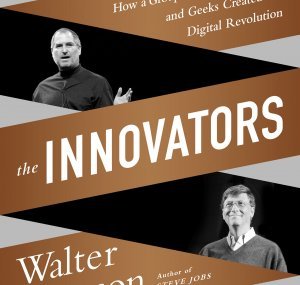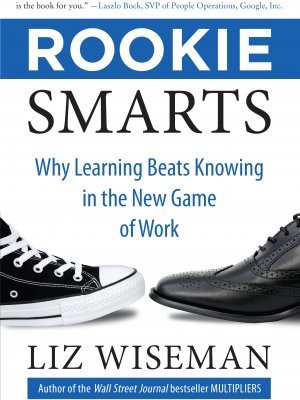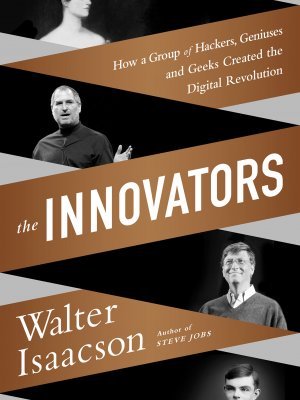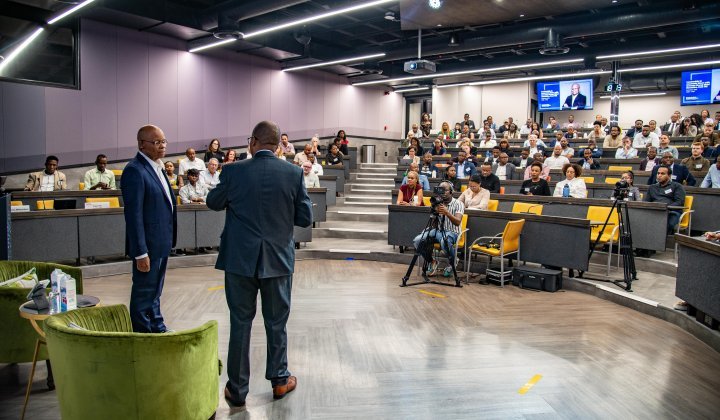Brilliant Idiots

The Innovators - Walter Isaacson - Simon & Schuster UK - R370.00
Steve Jobs, Bill Gates, Larry Page and Sergey Brin. Even if your interest in computers and computing is no more than superficial, these are names you would probably know. But what about John von Neumann, John Mauchly, Presper Eckert, Grace Hopper or Ada Lovelace? I had vaguely heard of von Neumann - a Princeton mathematician? - but certainly not the others.
Yet we can say with absolute certainty that the first four would not have been able to achieve their fantastic successes without the others, successes which have brought immeasurable benefits to the modern world. Ada Lovelace, for example, was the daughter of the poet, Lord Byron. She was also a collaborator and confidante of mathematician Charles Babbage, whose Difference Engine and Analytical Engine are held to be the forerunners of the modern computer. Yet, according to Walter Isaacson, in his new book The Innovators, it was Lovelace who understood that “such machines could process not only numbers but anything that could be notated in symbols”. Isaacson also credits Lovelace with writing “the first computer programme ever to be published”. All of this in the 1840s.
At its most basic level, The Innovators is a history of computers, computing and the men and women who made breakthrough after breakthrough. But if that were all, it would be as much fun as a history of washing machines or refrigerators. Instead, Isaacson describes a fascinating journey of discovery, seeded with intriguing and brilliant visionaries, to say nothing of a couple of deeply flawed characters. He is a writer of great skill and perception, not only author of the hugely successful biography of Steve Jobs, but also a former managing editor of Time and chairman of CNN, and he drives his tale with a central philosophical question: will machines - computers - ever become clever enough to supplant the human brain? More simply, “Can machines think?”
Of equal importance in his narrative is the question of innovation itself - hence the book’s title. Isaacson wants to know what drives innovation and under what circumstances it flourishes? Do you need a lonely genius toiling away in a dingy garret or rather a team of engineers, all brandishing PhDs, in well-funded, brightly lit laboratories?
A third strand of enquiry - something of a sub-theme until the book’s very last movement - involves the relationship between mathematics and physics on one side, and the humanities on the other. Isaacson reminds us that not only did Ada Lovelace have a poet for a father but also a mathematician for a mother. Lovelace went on to coin the phrase “poetical science” but isn’t that what we have in the exquisite form and high functionality of so many Apple products? Steve Jobs understood this perfectly, and Isaacson quotes from Jobs’ final product launch in 2011: “ “It’s in Apple’s DNA that technology alone is not enough - that it’s technology married with liberal arts, married with the humanities, that yields us the result that makes our heart sing.” That’s what made him the most creative technology innovator of his era.”
Isaacson and many of the people interviewed for The Innovators are firmly of the belief that machines will never be able to think the way humans do. That they can process incredible amounts of information at almost the speed of light - i.e. enough chess moves per second for IBM’s Deep Blue to beat world chess champion Garri Kasparov - makes them nothing more than “brilliant idiots”, to use the words of IBM’s director of research, John E. Kelly III.
Instead, the future holds closer and closer symbiosis between man and machine: what are computers good at and what are we good at? In that alliance lies enormous strength. To begin to understand what it might mean for you and your business, you would do well to read The Innovators.
The Ethical Way
Ethics Can - Cynthia Schoeman - Kno Res Publishing - R299.
The concept of ethics is probably as old as humanity; certainly it stretches back to the ancient Greeks. Its roots lie in “doing the right thing - even when no-one else is watching”, and that, in turn, probably ties in to the old biblical injunction: “Do unto others as you would have them do unto you.” In essence, a high standard of ethical behaviour becomes a recipe for a frictionless social and business life.
All of which makes it quite alarming that modern ethical standards, especially in business, have fallen so low. Author, trainer and business ethics expert Cynthia Schoeman is determined to change that, arguing that, if nothing else, good ethics makes good business sense. Her argument’s moral dimension has recently been given some very sharp teeth by changes to the Companies Act as well as the recommendations of the King Committee on Corporate Governance.
Her latest book - Ethics Can - is a meticulously researched text that will tell you everything you need to know about the subject: what we mean when we talk about workplace ethics, whose role is ethics in the company, managing workplace ethics and how to implement a monitoring and reporting programme. It’s also structured in such a way that you could use it in the workplace as a primer to stimulate discussion and allow these critical issues to surface. Highly recommended.
Beginners Please!
Rookie Smarts - Why Learning Beats Knowing in the New Game of Work - Liz Wiseman - Harper Collins - R350.00
A wise old grey-beard will always have the edge over a downy-cheeked newcomer, right? Or, to put it another way, deep experience in the ways of the world and the corporation wins the day every time over naive innocence, not so?
Well, actually, no. More often than not, according to new research by former Oracle senior executive and now top coach and author Liz Wiseman, it’s the other way round. Experience becomes a mask for a bored, we’ve-always-done-it-this-way approach compared with the intensity of the blind panic which flows from being thrust into a new, often completely unfamiliar, situation.
This is the world of the rookie, who instantly reaches out to anyone and everyone for help, asks deeply obvious, yet fundamental, questions and moves at a break-neck pace to avert disaster. Knowledge and learning are acquired at a rapid pace and - yes, this is possible! - the people involved work incredibly hard but have fun as they do so. The rookie mindset is particularly, although not exclusively, applicable in a high-tech environment, where constant reiteration is the name of the game and the work is innovative and urgent.
Rookies come in various flavours, according to Wiseman - Backpackers, Hunter-Gatherers, Firewalkers and Pioneers - and she compares them to Veterans, firmly ensconced in their comfort zones: Caretakers, Local Guides, Marathoners and Settlers.
There are some obvious exceptions: you don’t really want a rookie pilot landing your jet airliner or a rookie surgeon performing open heart surgery on you. But, by and large, Wiseman makes a compelling case for freshness and inexperience and one which is about generating infectious energy in the company. And for those of us who are grey-beards, perhaps in need of some rejuvenation, she also sets out a very concrete course of action, while reminding us that the late, great management expert Peter Drucker did the bulk of his magisterial work when he was past the age of 65! That, says Wiseman, is because Drucker was insatiably curious - one of the key traits of the rookie.






